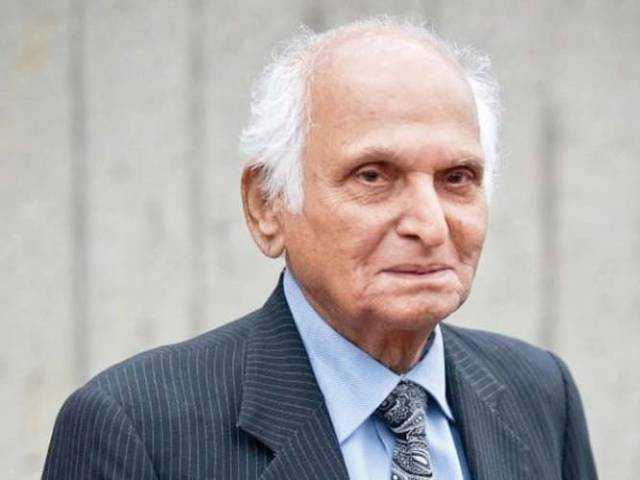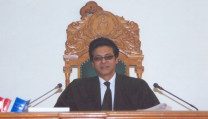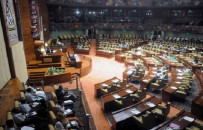Remembering Intizar Husain who always grieved the great divide
Urdu literary great avoided questions over his decision to move to Pakistan even 5 decades after partition

Five decades even after the partition, the Urdu literary great avoided questions over his decision to move to Pakistan. PHOTO: FILE
Husain lived a long life – 93 years, and wrote for 70. If that in itself is not commendable, he wrote across genres – covering themes as diverse as partition (the closest to his heart), about Hindu and Islamic mythology and their fantastic amalgamation – drawing from the Katha Saritasagar, the Mahabharata, the Jataka Tales and Alif Laila.
Urdu mourns as Intizar Hussain dies
In his writings, he always pined for that perfect past, often shaming the ugliness of modernity, exposing the hypocrisy of the religious brigade that unleashed terror in the country that he made a home.
Husain also wrote with passion about the rape of the environment, of the missing koel, of the ‘assassination’ of trees, of the zameen (land), even as the heavyweight progressives trashed him as anti-progress, anti-national and hyper-nostalgic.
Husain's move to Pakistan was an unthinking act. He moved because his teacher-mentor Muhammad Hasan Askari asked him to in a message on Radio Pakistan. “I am going to stay here. Please come and join me. And further, ask Intizar to come with you.”
Husain decided to join Askari, becoming a guest in a very small, cramped house where Askari himself was a guest. This impulsive move haunted him for several decades, accentuated by his being a Shia. A move, he wrote about often, for instance, in Basti and in Hindustan Se Ek Khat amongst others. In 2012, Basti was included as the only South Asian novel in New York Book Review's Hundred Classic Novels of the 20th Century.
Five decades after the partition, Husain avoided questions over his decision to move to Pakistan. It happened a long time ago and is now the realm of historians, he would say, or “I feel very disappointed that I have no saga of being attacked, of being looted or burned or assaulted”.
His writings, however, were full of angst. “Our house was steeped in [an] Islamic atmosphere, but the atmosphere around was steeped in Hindu colour...Now the Wahhabis have taken the fun out of it.”
Husain insisted his writings were not political. But, as Farooqui points out in his book titled, A Requiem for Pakistan: The World of Intizar Husain (2016), there are ways of being political which go beyond commenting on the current political dispensation: “Suddenly one morning I realised that the place where we live is a good vantage point to witness those public hangings”. OR “Every affliction that falls from the sky and every turbulence that arises from the earth comes asking for the address of Pakistan and having arrived here takes us into its arms.”
‘Intizar Husain a memory of the past, vision for the future’
Pakistan's nuclear tests troubled him deeply. “When I pick up my pen all I can think of is the Chaghi mountain. First, it trembles a bit, and then its colour begins to change...I am not under the spell of the nuclear bomb, I am breathing under the shadow of the pain of that mountain. If I can ride over this torture I may be able to write a story. Between me and my story lies that bruised mountain.”
After decades of writing, Husain rues the ineffectiveness of the written word. Yet he never stopped writing – like the protagonist Shahrzad in Shahrzad Ke Naam who lived and managed to change the heart of the king through her storytelling.
Farooqui shares Husain's and, thereby Shahrzad's, compulsion to tell a story – “in the fear of death”. “I too have written this (book) with a sword hanging over my head. I may soon be sent to jail for seven years for a crime I didn't commit.”
Yet, Farooqui manages to light up the book with little anecdotes: “Nobody had then thought that partition would mean irrevocable borders. The Muslim League leader Khaliquzzaman was quite convinced that he would be able to live in his mansion in Calcutta [now Kolkata], even while he became a minister in the Pakistani government.”
For Farooqui, the book is as much about Partition, as about a writer's life post-partition. The scenes at the Pak Tea House, the adda (base) of writers - “when the Amritsari crowd gathers - all that they talk about is Amritsar, Amritsar, Amritsar. As if there is only one city on the world map...”
Writers such as Munir Niyazi and Husain missing their lost paradise – the Basti, the peacocks, the mango groves; and people like Mim Hasan Lateefi, who lost everything during the move to Pakistan, asking Husain to buy him tea and two pieces of toast. The toast for the birds and dogs.
Intizar Hussain – the seller of dreams
Farooqui met Husain a couple of times. On one such occasion, Husain talked about the rise of Islamic fundamentalism in Pakistan: “The thing is that they do not regard us as Muslims and my response to that is that either I am not a Muslim or they are not Muslims. One of us is certainly a Kafir (infidel). That is all I can say.”
Husain died on February 3, 2016 – the most mourned death of a literary figure after Faiz Ahmed Faiz, despite the fact he was Shia.
Farooqui wrote this book under exceptional circumstances and he is aware of the flaws - tighter editing, better structuring, for sure.
“I got there first so I have done what I could. Now you can do better if you like,” he announces up front in the preface to the book.
To borrow a pun from Niranjan Ramkrishnan, who has written the foreword of the book, it was Husain's “Shia good fortune” to have lived to be 93 and died peacefully in a post-Zia Pakistan. This good fortune seems to have rubbed on Farooqui too - with him winning an impossible battle at the courts.
Lamat R Hasan is a Delhi-based independent journalist who lived in Pakistan during 2007-2013.



















COMMENTS
Comments are moderated and generally will be posted if they are on-topic and not abusive.
For more information, please see our Comments FAQ